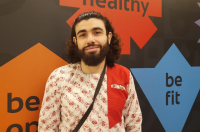In this article, we’ll be discussing potential questions asked by supervisors during a PhD interview and some useful tips on how to answer them wisely. Even though we won't be focusing on the questions you might get at a non-academic job interview, you might find the tips below helpful when preparing for one, as well.
Question #1: Tell us about yourself.
This is one of the most dreaded questions in every interview. You never quite know how detailed your answer should be. Also, it is difficult to anticipate what sort of answer the interviewer is actually looking for. In these situations, you must always remember the SHE formula – be succinct, honest, and engaging. But what does that mean?
Succinct – have a concise, well-structured answer.
Honest – state your true skills, experiences, and achievements.
Engaging – the way you present your story is essential. Shape your story well.
Question #2: What are your career goals?
This is another very popular question in such interviews. My personal approach is to state my short-term goals, i.e. what I intend to do in the next 1 or 2 years, and then provide a quick overview of my long-term goals, such as a 5-year or even a 10-year plan. So far, this has worked for me well.
Question #3: What are your strengths?
Everyone has a unique set of strengths. But to answer this question perfectly, one must be well aware of the expectations of the lab/supervisor. Provided that you've thoroughly researched the lab ahead of time, try to highlight those skills that would be highly beneficial for the work being done there. Also, it’s not all about hard skills. Skills like communication, time management, and creative writing could also be important to mention.
Question #4: What is your greatest weakness?
This is a tricky one. In every interview, be it a job interview or an academic one, you can always expect to be asked this question. The smartest way to deal with it is to be humble and authentic. But always remember not to mention any weaknesses that might disqualify you completely.

Work on your communication skills. Participating in conferences and seminars can make you familiar with answering questions and talking about your research. Credit: Megabyte Media
Question #5: Do you prefer working in a team or as an individual?
Another tricky question here, and you need to answer it maturely. Both of the given options have their own pros and cons. Therefore, it is wise to structure your answer around them.
Here’s an example: I am a flexible person who is happy to adapt to any working situation. I generally aim to make an impact both individually and as a team player.
To this, you may add a few statistical figures or mention key milestones from your career.
Question #6: Where do you see yourself in 10 years?
People might confuse this question with the one about career goals. The difference is that here, you should shed light on the kind of person you aspire to become. Talk about character development, behavioral traits, and family goals. This is a great opportunity to show your personal side.
While preparation is crucial, you should also be ready for a curveball. Often, interviewers might want to see how you can tackle situations that you were not prepared for. In those circumstances, always abide by the SAR formula, which stands for situation, action, and result. Read the situation at hand with a calm mind, analyze it, formulate your plan of action, and evaluate the possible results that your action might have.
If you follow these steps, I’m pretty sure that you will pass your interview with flying colors. Here’s a pro tip: don’t go blindly into an interview. Instead, try establishing a connection with your potential supervisor beforehand. This way, you will be far less nervous while facing them. Also, you will have an idea of their personality and what kind of answers they might expect. This will definitely increase your chance of succeeding by manifold.
Learn more about ITMO’s PhD programs, scholarship opportunities, and how to apply here. You can also check out ITMO’s list of potential PhD supervisors here.
For more queries regarding PhD studies at ITMO, reach out to aspirantura@itmo.ru or visit this page.




